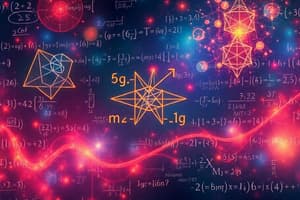Podcast
Questions and Answers
What is the purpose of a variable in algebra?
What is the purpose of a variable in algebra?
- To represent unknown values (correct)
- To represent known quantities
- To simplify expressions
- To categorize data
Which of the following represents a correct inequality?
Which of the following represents a correct inequality?
- x + 5 = 10
- 2x + 3 = 7
- 3y - 4 < 5 (correct)
- x + 5 > 10 (correct)
What is the purpose of the distributive property in algebra?
What is the purpose of the distributive property in algebra?
- To isolate variables
- To factor polynomials
- To simplify fractions
- To expand expressions (correct)
What is an expression in algebra?
What is an expression in algebra?
Which of the following statements about equations is true?
Which of the following statements about equations is true?
In linear algebra, which of the following concepts is primarily studied?
In linear algebra, which of the following concepts is primarily studied?
How do you check the solution of an equation?
How do you check the solution of an equation?
Which is a true statement about factoring in algebra?
Which is a true statement about factoring in algebra?
What does the quadratic formula solve for?
What does the quadratic formula solve for?
What does the slope represent in an equation?
What does the slope represent in an equation?
Flashcards are hidden until you start studying
Study Notes
Algebra Overview
- Branch of mathematics dealing with symbols and the rules for manipulating those symbols.
- Symbols represent numbers and quantities in formulas and equations.
Key Concepts
-
Variables
- Symbols (often letters) that represent unknown values.
- Commonly used symbols: x, y, z.
-
Expressions
- Combinations of variables, numbers, and operations (e.g., 3x + 5).
- Can be simplified but not solved.
-
Equations
- Mathematical statements that assert the equality of two expressions (e.g., 2x + 3 = 7).
- Can be solved to find the value of variables.
-
Inequalities
- Expressions that show the relationship between two values that are not necessarily equal (e.g., x + 5 > 10).
- Solutions involve ranges of values.
Operations in Algebra
-
Addition and Subtraction
- Combine like terms to simplify expressions.
-
Multiplication and Division
- Use the distributive property (a(b + c) = ab + ac).
- Be cautious with signs when dividing or multiplying by negative numbers.
Types of Algebra
-
Elementary Algebra
- Basic operations, simplification, and solving linear equations.
-
Abstract Algebra
- Studies algebraic structures such as groups, rings, and fields.
-
Linear Algebra
- Focuses on vector spaces and linear mappings between these spaces.
- Key concepts include matrices, determinants, and eigenvalues.
Key Techniques
-
Factoring
- Breaking down expressions into products of simpler expressions (e.g., x^2 - 9 = (x - 3)(x + 3)).
-
Solving Equations
- Isolate the variable through inverse operations.
- Check solutions by substituting back into the original equation.
-
Graphing
- Visual representation of equations in a coordinate system.
- Understanding slopes and intercepts for linear equations.
Important Formulas
- Quadratic Formula: x = (-b ± √(b² - 4ac)) / (2a)
- Slope: m = (y2 - y1) / (x2 - x1) for two points (x1, y1) and (x2, y2).
Applications of Algebra
- Used in various fields such as engineering, economics, physics, and computer science.
- Essential for solving real-world problems by modeling relationships between variables.
Algebra Overview
- Involves symbols and rules for manipulating them, representing numbers and quantities.
Key Concepts
- Variables: Represent unknown values, commonly denoted as x, y, z.
- Expressions: Consist of variables, numbers, and operations like addition and multiplication (e.g., 3x + 5); can be simplified but not solved.
- Equations: Assert the equality of two expressions (e.g., 2x + 3 = 7); can be solved to determine variable values.
- Inequalities: Indicate a relationship where two values are not equal (e.g., x + 5 > 10); solution sets are ranges of values.
Operations in Algebra
- Addition and Subtraction: Combine like terms for expression simplification.
- Multiplication and Division: Apply the distributive property (a(b + c) = ab + ac); be cautious with signs for negative numbers.
Types of Algebra
- Elementary Algebra: Covers basic operations, simplification, and solving linear equations.
- Abstract Algebra: Investigates algebraic structures like groups, rings, and fields.
- Linear Algebra: Focuses on vector spaces and linear mappings; includes concepts such as matrices, determinants, and eigenvalues.
Key Techniques
- Factoring: Decomposes expressions into simpler products (e.g., x^2 - 9 = (x - 3)(x + 3)).
- Solving Equations: Isolate variables using inverse operations; verify solutions by substituting them back.
- Graphing: Offers a visual representation of equations in a coordinate system; understand slopes and y-intercepts for linear equations.
Important Formulas
- Quadratic Formula: x = (-b ± √(b² - 4ac)) / (2a) for solving quadratic equations.
- Slope Formula: m = (y2 - y1) / (x2 - x1) calculates the slope between two points (x1, y1) and (x2, y2).
Applications of Algebra
- Integral to various fields including engineering, economics, physics, and computer science.
- Essential for modeling and solving real-world problems by understanding relationships between variables.
Studying That Suits You
Use AI to generate personalized quizzes and flashcards to suit your learning preferences.




